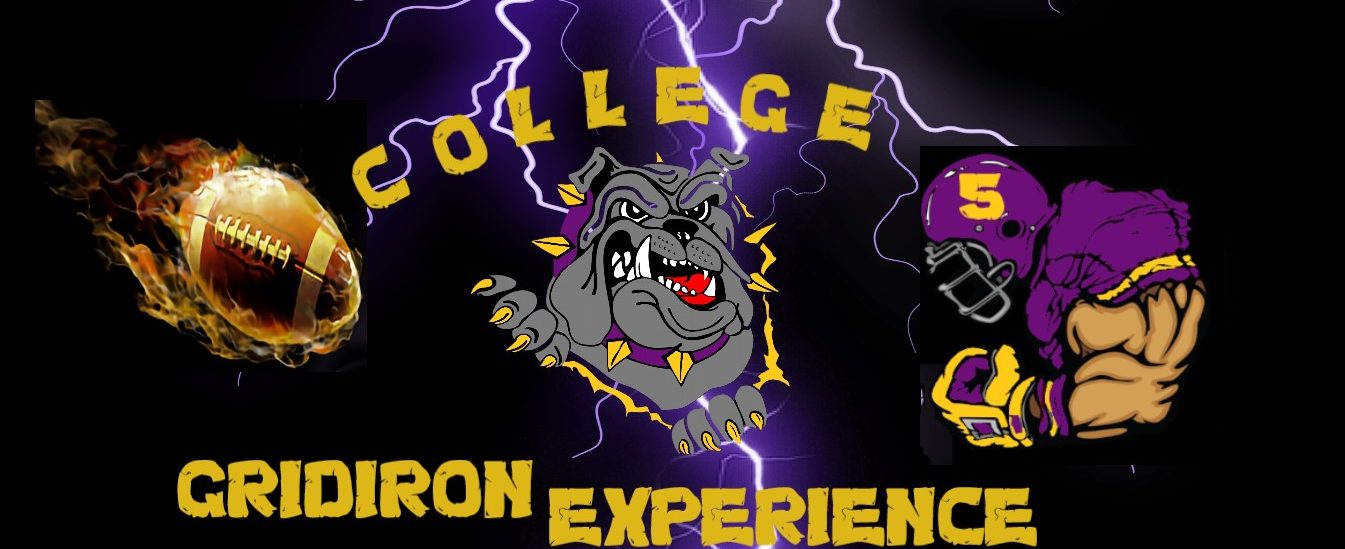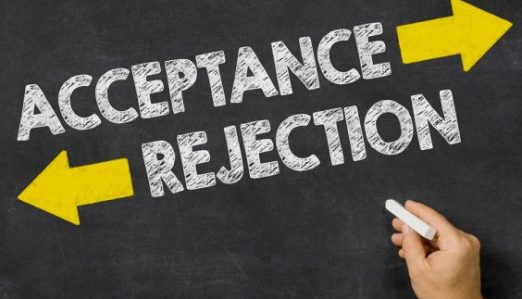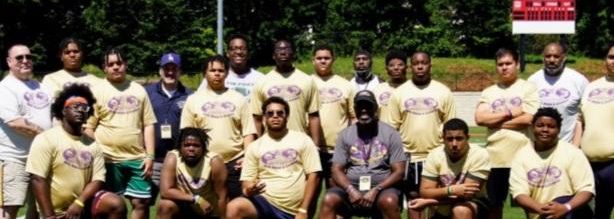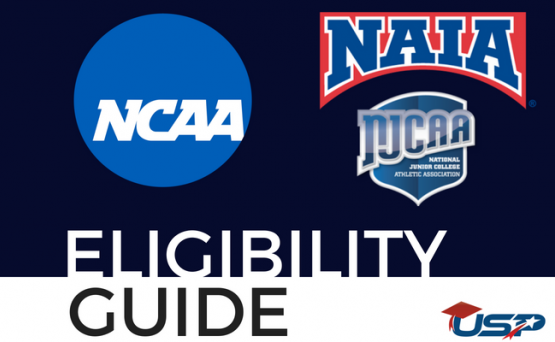

Mission
The mission is to provide a pathway to Colleges and Universities for young men who are interested in continuing their education and athletic abilities at the next level. Created by Luther Johnson (known as Coach Johnson), who brings years of football knowledge and competitiveness to a very needed community. Coach Johnson goal is to help as many young men get into college as possible. All they (the players) need is a CHANCE and Coach Johnson is willing to Help!
Objective For COLLEGE GRIDIRON EXPERIENCE
The idea for COLLEGE GRIDIRON EXPERIENCE came
from Coach Johnson involvement with the Phil Simms
North-South Annual Football Classic in New Jersey that
highlights high school athletes throughout the State of New
Jersey. After this point Coach Johnson wanted to help
highlight the talents of all young men that are interested in
attending college and playing football. Hence, came the
development of the College Gridiron Experience.
HBCU TEAMS and CONFERENCES
MID-EASTERN ATHLETIC CONFERENCE (MEAC) DIV. 1
Delaware State University
Howard University
South Carolina State University
Morgan State University
Norfolk State University
North Carolina Central University
BIG SOUTH CONFERENCE DIV.1
North Carolina A&T University
Robert Morris University
Gardner-Webb University
Campbell University
Charleston Southern University
Bryant University
SOUTH WESTERN ATHLETIC CONFERENCE (SWAC) DIV. 1
Alcorn State University
Alabama A&M University
Alabama State University
Bethune-Cookman University
Florida A&M University
Grambling State University
Jackson State University
Mississippi State University
Prairie View A&M University
Southern University
Texas Southern University
Arkansas-Pine Bluff University
COLONIAL ATHLETIC ASSOCIATION (CAA) DIV. 1
Hampton University
Monmouth University
James Madison University
Villanova University
University of Rhode Island
University of Maine
Richmond University
William & Mary University
Stony Brook University
University of Delaware
Towson University
University of New Hampshire
University of Albany
CENTRAL INTERCOLLEGIATE ATHLETIC ASSOCIATION
(CIAA) DIV. 2
Bowie State University
Chowan Shaw University
Elizabeth City State University
St. Augustine's University
Fayetteville State University
Johnson C. Smith University
Virginia Union University
Virginia State University
Winston-Salem State University
Livingston College
Bluefield State University
Shaw University
SOUTH INTERCOLLEGIATE ATHLETIC CONFERENCE (SIAC) DIV. 2
Miles College
Lane College
Allen University
Benedict College
Tuskegee University
Morehouse College
Albany State University
Central State University
Clark Atlanta University
Fort Valley State University
Savannah State University
Edward Waters University
Kentucky State University
MOUNTAIN EAST CONFERENCE
(MEC) DIV. 2
Frostburg State University
Fairmont State University
Notre Dame University
West Liberty University
University of Charleston
Concord University
UNC Pembroke
Glenville State University
West Virginia State University
Alderson Broaddus University
Wheeling University
West Virginia Wesleyan College
JUNIOR COLLEGES AND POSTGRADUATE SCHOOLS
THE JERSEY GATOR POST-GRAD PROGRAM
COLLEGE ASSISTANCE PLACEMENT PROGRAM (CAPP)
LACKAWANNA COLLEGE
NJ WARRIORS JUCO FOOTBALL
MONROE COLLEGE (NEW ROCHELLE)
Omega Prep Academy
TEAMS and CONFERENCES
COLONIAL ATHLETIC CONFERENCE (CAA)
(FCS) DIV. 1
University at Albany
University of Delaware
Elon University
Maine University
University of New Hampshire
Richmond University
Stony Brook University
Towson University
University of Rhode Island
Villanova University
William & Mary University
Monmouth University
Hampton University
NORTHEAST CONFERENCE (NEC) (FCS) DIV. 1-AA
Central Connecticut State University
Duquesne University
Long Island University
Sacred Heart University
Saint Francis University
Wagner University
Stonehill University
Merrimack College
MIDDLE AMERICAN CONFERENCE (MAC) DIV. 1
EAST WEST
Kent State University
Northern Illinois University
Miami University
Ball State University
Buffalo University
Eastern Michigan University
Ohio University
Central Michigan University
Bowling GreenUniversity
Western Michigan University
Akron University
Toledo University
PATRIOT LEAGUE (FCS) DIV. 1
Holy Cross University
Bucknell University
Fordham University
Lafayette University
Colgate University
Lehigh University
Georgetown University
NORTHEAST-10 CONFERENCE (NEC-10) (FCS) DIV. 2
American International College
Assumption University
Franklin Pierce University
Bentley University
Saint Anselm College
Southern Ct State University
University of New Haven
Pace University
New Jersey Athletic Conference (NJAC) DIV. 3
Salisbury University
Montclair State University
Rowan University
William Paterson College
Kean University
The College of NJ
Christopher Newport University
PENNSYLVANIA STATE ATHLETIC CONFERENCE
(PSAC) DIV. 2
EAST WEST
Bloomsburg University
California University of PA (CAL U)
East Stroudsburg University
Clarion University
Kutztown University
Edinboro University
Lock Haven University
Gannon University
Millersville University
Slippery Rock University
Shepherd University
Mercyhurst University
Shippensburg University
Seton Hill University
West Chester University
Indiana University of PA (I.U.P)
Middle Atlantic Conference (MAC) DIV.3
Albright University
Wilkes University
Alvernia University
Widener University
FDU-Florham University
Delaware Valley (Del Val)University
Lycoming University
Stevenson University
King's College (Pa.)
Lebanon Valley College
Misericordia University
Eastern University
Hood College
Messiah University
York College (Pa.)
Arcadia University
Desales University
Stevens Institute of Technology
Are You Eligible ?
Division I Academic Eligibility:
Three years of math (Algebra 1 or higher) Two years of natural/physical science (including one year of lab science if your high school offers it) One additional year of English, math or natural/physical science. Two years of social science
Division II Academic Eligibility:
To be eligible to compete in NCAA sports during your first year at a Division II school, you must meet academic requirements for your core courses, grade-point average (GPA) and test scores. … Complete 16 core courses: Three years of English. Two years of math (Algebra 1 or higher).NCAA Division II schools tend to be smaller public universities or private colleges. These schools have more limited finances than their Division I counterparts, which is reflected in the number of scholarships they can offer. The NCAA limits each Division II school to 36 full, or partial, scholarships per year.
What is a Fee Waiver?
If you are unable to pay the registration fee for the NCAA Eligibility Center due to financial considerations, there is an option in the payment section to indicate you are eligible to receive a fee waiver. You are eligible for a waiver of the registration fee if you have received a waiver of the SAT or ACT fee. (This is not the same as a U.S. state voucher.) You must ask an authorized high school official(Guidance Counselor) to submit your fee waiver verification online after you complete your registration. If you request a fee waiver and are unable to receive the fee waiver, you can simply log back in to your account at eligibilitycenter.org and make a payment with a credit card or e-check.
TO GET YOUR FAFSA #(Financial Aid #) GOTO WWW.FAFSA.GOV TO COMPLETE APPLICATION
NCAA ELIGIBITY RESOURCES
For Initial-eligibility, registration and certification process, please refer the registration website, eligibilitycenter.org, or the educational site, ncaa.org/playcollegesports for even more information.
Links to many of our resources are below and can also be found on our School Presentation Resources page.

Eligibility Center Website: The official registration and certification site for college-bound student-athletes who plan to compete at an NCAA Division I or II college.
): A quick guide to the academic standards and steps that it takes to become an NCAA Division I or II student-athlete.
Division I Academic Requirements Guide: A complete breakdown of the NCAA Division I initial-eligibility standards.
Division II Academic Requirements Guide: A complete breakdown of the NCAA Division II initial-eligibility standards.
Guide for the College-Bound Student-Athlete: The Guide is a highly comprehensive tool that has been designed to help students and families understand the NCAA initial-eligibility process. It also helps to prepare student-athletes and families for the transition from high school to becoming an NCAA Division I or II student-athlete.
When can Colleges Start Recruiting for Football?
Generally speaking, the most important dates on the calendar will be June 15th or September 1st (depending on your sport), going into the athlete’s junior year of high school. For most sports, this is when coaches can start reaching out to recruits.
How to Get Noticed by College Coaches and Scouts
1.Research Each Team by Visiting Their University’s Sports Web page.
2.Look for Athletes From Your Area and Ask Them for Information and Help.
3.Talk About the Majors/Academic Programs that Interest You at Their School.
4. Ask Informed Questions.
Do Coaches look at Recruiting Questionnaires?
Because Recruiting questionnaires are an easy way for coaches to get your information, you might think that all you need to do is simply fill them out.All of the recruiting best practices apply, such as doing your research on a team, making sure the school is a good fit, and writing personalized emails
Can High School Coaches Contact College Coaches?
For most athletes,recruiting starts before the NCAA recruiting rules allow college coaches to contact athletes. As a recruit, you can always call coaches—and they can answer! But they cannot call you back if they miss your call. To work through this, some athletes will get their high school/club coach involved.
What is a College Football Junior Day?
A Junior Day is a recruiting strategy that college coaches are using to get high school athletes on their campus. Junior Days have been around previously, but they are now getting to be more exclusive – or at least starting to serve more of a purpose than before
What do you do at a Junior Day?
The basic definition of a recruiting Junior Day is where a college brings in a number of their sought after recruits in the current junior class. Bringing these juniors allows the athletes to see the school, meet the coaches, get a tour of the facilities, and learn more about the program in general.
What does it mean if a College Coach Emails You?
Recruiting is all about relationships. When you receive an email from a college coach it means nothing more than that your child is good enough to play at their program.They are fishing. … Have your child email the coach,then follow up with a phone call if they don’t get a response.
What does it mean when you get an Unofficial Visit?
Unofficial visits are visits that prospects finance themselves. An unofficial visit might be very official in that it might have a set itinerary, be for multiple days, or be a very important part of a prospect’s recruitment.Prospects may take an unofficial visit at any age or grade level.
How many Official Visits are allowed?
Per NCAA guidelines for most sports, you can only visit a college on an official visit once and have only five total visits to all Division I schools; however, an unlimited number of official visits may be made to Division II schools.
When can an Athlete Commit to a College?
The only time an athlete can officially commit to a college is during the signing period, when they sign their national letter of intent. Any story you see of an athlete getting an offer or committing to a school before the signing period their senior year is unofficial.
Upcoming Events

C.G.E BIG MAN's CLINIC (Offense & Defense LINEMAN ONLY)
for Grades 8th Grades through 11th - Classes of 25, 26, 27, and 28*
Clinics: 1) Sun. April 21st (Veterans Memorial Sports Complex) COMPLETED, 2) Sun. April 28th (@ Immaculate HS), 3) Sat. May 4th (@ Mt Olive HS), 4) Sat. May 11th (@ Grace Buckley Park in Paterson)
Early Bird Cost: $30.00. Cash App: $CoachLMJohnson / PayPal: @coachlmjohnson
Early Bird SPECIAL Deadlines for:
1) Wed. April 17th (Veterans Memorial Sports Complex) COMPLETED, 2) Wed. April 24th (Immaculate HS), 3) Wed. May 1st (Mt Olive HS),
4) Wed. May 8th (Grace Buckley Park in Paterson)
Walk-Up Cost: $40.00 Each clinic is LIMITED to 50 Players!
To Register: SCAN the QR Code below or Use the Link below
https://forms.gle/nHEQ6wWyMEEMPE8r5
HARD WORK BEATS TALENT,
WHEN TALENT DOESN'T WORK HARD!

Clinic Coaches:
Coach Rich Williams - Offensive Line Coach Norris Daus - Defensive Line
Willingboro High School North/South Executive Board Member
25 years coaching Phil Simms N/S Asst. (South) General Manager
4 Sectional & 1 Regional Championship Semi Professional Coach: NJ Militia, Knights, & Pitbulls
2018 NJFCA South Jersey Assistant (COY) Junior College: C.A.P.P Academy, Jersey Coast Academy
Coach of the Year High Schools: Winslow Township, Lakewood, &
Pt Pleasant Borough
==============================================================================
PRO AGILITY (L) DRILLS
5-10-5 Pro Agility
CLINIC ITINERARY
Height & Weight Recording Stations
Dynamic & Statics *STRETCH*
Agility Testing
PRO AGILITY (5-10-5)
BROAD JUMP
Fundamentals Instructions
OFFENSIVE LINE
Stance, Footwork, Alignment, Handwork
DEFENSIVE LINE
Stance, Footwork, Alignment, Handwork
Football Rules (against a)
3 MAN Front & 4 MAN Front
Clinic Wrap-up & Awards Presentations
Broad Jump
O-LINE DRILLS
